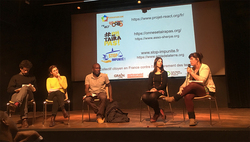
The French "We will not be silenced" and anti-land grab collectives held a public debate in Paris on 13 February 2019 where these issues came up. (Photo: Régis Essono)
Defamatory vs defamation
Over the past few years, GRAIN and other groups have been drawn into a serious of legal actions to defend the rights of people – journalists, rural communities, researchers, NGO workers and unionists – to talk about what they see and experience as land grabbing and other abuses committed not only by multinational corporations in the agribusiness arena, but government authorities and local elites as well.
The partner corporations Socfin and Bolloré – who sit on each other's boards and invest in each other's lucrative operations, including oil palm and rubber plantations – are very active at taking people to court for what they call defamation. Under French law, where many of these trials have played out, that means harming someone's honour or reputation.
But no one is deliberately lying. They're telling it like it is, and the companies have been losing nearly all these court cases.
Take the latest example. In 2017, Socfin and Socapalm (Socfin's subsidiary in Cameroon) took Mediapart, Sherpa, ReAct, L’Obs and Le Point to court for defamation. They charged the three French media outfits and two NGOs of doing wrong by publishing a 2015 press release written by ReAct which explained the realities and demands of local communities fighting what they consider a massive land grab in their home territory in Cameroon – and the terrible living and working conditions that go with being deprived of their lands. Socfin's problem was the term "land grabbing", which they feel is incorrect and should not be used. (GRAIN was asked to serve as witness at the trial and testify to the reality of land grabbing as a global trend.)
In 2018, the NGOs and journalists were found not guilty. Socfin moved to appeal, but just last week gave up. The company has been tweeting and touting that, in reality, they "won" because in the court's ruling, the judge mentioned that the words "land grabbing" were of a defamatory nature. But as Sherpa and other legal experts snap back, this is incorrect. Even though the court found the term “land grabbing” defamatory because it’s a value judgement that can be debated as to whether its true or not, there was no defamation! The media and activists were doing their jobs, reporting and relaying what the communities are experiencing, saying and suffering through, in good faith.
Winning in court, i.e. achieving justice, is not the point of these corporate lawsuits. The point is to wear people down, intimidate journalists and activists, waste people's (including the court's, apparently) time and energy. They're pretty good at that, but not enough.
We will all continue doing our work to call out companies and government officials for their involvement in land grabbing and related abuses as people on the ground truly live it. We will call a spade a spade and fight for real justice. There is no point in doing otherwise. We have to stop the crime of land grabbing altogether.











